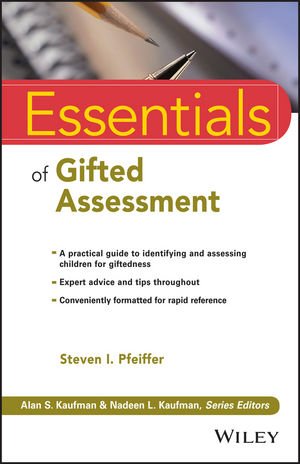
Essentials of Gifted Assessment
John Wiley & Sons Inc (Verlag)
978-1-118-58920-5 (ISBN)
An Up-to-Date Overview of the Theory and Practice Underlying Gifted Assessment Essentials of Gifted Assessment introduces readers to the theory and practice underlying gifted assessment. Steven Pfeiffer, a leading expert in the field of gifted assessment, discusses what it means to be gifted, why we should identify gifted students, and the purposes of gifted assessment.
Well-organized and engaging, the book examines key principles of gifted assessment and provides an up-to-date overview of gifted assessment measures. Topics include the use of local norms, measuring creativity and motivation, nonverbal measures, the importance of recurring gifted assessment, multi-potentiality, gifted testing and minority group students, and evaluating the twice-exceptional student. Early identification and intervention greatly benefits gifted students, who may otherwise never realize their full potential. Throughout the book, Pfeiffer equips school psychologists with the tools they need to:
Identify and assess uniquely bright and talented students
Integrate multiple assessment measures including intelligence, cognitive ability, and achievement tests
Assess gifted students with coexisting disabilities and disorders
Promote the abilities of gifted students using evidence-based strategies
The book also includes extensive illustrative material, such as callout boxes and case examples, that facilitate use as a quick reference, plus end-of-chapter "Test Yourself" questions that help reinforce key concepts. Essentials of Gifted Assessment helps new and seasoned school psychologists and other professionals acquire the skills and knowledge needed for ethical, evidence-based, and informed clinical practice with high-ability students.
STEVEN I. PFEIFFER, PHD, is a licensed psychologist and Professor and Director of Clinical Training in the combined School Psychology and Counseling Psychology program at Florida State University. An authority on the psychology of giftedness, he is the lead author of the Gifted Rating Scales, a widely used measure to help identify gifted students published by Pearson Assessment. Previously, Dr. Pfeiffer served as Executive Director of Duke University's acclaimed precollegiate gifted program.
Series Preface xi
Acknowledgments xiii
One Introduction to Gifted Assessment 1
Who Are the Gifted? 1
Brief History of Gifted Education 3
Giftedness as a Social Construction 6
Tripartite Model 7
Should We Identify Gifted Students? 13
Purposes of Gifted Assessment 14
Two Conceptions of Giftedness Guide Gifted Assessment 17
Traditional Psychometric View 19
Talent Development Models 21
Differentiated Model of Giftedness and Talent 22
Subotnik’s Developmental Transitions in Giftedness and Talent 23
Stanley’s Talent Search Model 27
Renzulli’s Three-Ring Conception of Giftedness 29
Expert Performance Perspective 30
Multiple Intelligences Model 32
Theory of Successful Intelligence: WICS 33
Synthesis of Divergent Views of Giftedness 35
Conclusion 40
Three Gifted Assessment: Guiding Principles and Fundamental Beliefs 44
Fundamental Beliefs of Gifted Assessment 44
Key Principles in Gifted Assessment 48
How We Define Gifted Is Important 48
Assessment Should Consider Types of Available Gifted Programs 49
Psychometrics Count 51
People, Not Test Scores, Should Make Diagnostic Decisions 52
Multiple Measures Are an Advantage 53
Local Norms and Recurring Assessment Are Advantages 53
Beliefs and Principles Conclusion 57
Decision-Making or Selection Models 58
Four Measuring Intellectual and Academic Ability 63
Why and When to Use Tests of Cognitive and Academic Ability 64
Where Does Abstract Reasoning Fit In? 65
What Tests of Cognitive Ability Measure 67
General and Specific Abilities 68
Hierarchical Models: Cattell-Horn-Carroll 68
Abstract Reasoning 70
General Intelligence (g) 71
Clinical Insights 73
General Ability Index 73
Clinical Considerations and Adaptations for High-Ability Students 75
Tests with High Ceilings 75
Testing the Limits 76
Extended Norms 77
Levels of Intellectual Giftedness 78
Some Popular IQ Tests Used in Gifted Assessment 79
Wechsler Intelligence Scale for Children—Fifth Edition 80
Wechsler Preschool and Primary Scale of Intelligence—Fourth Edition 81
Stanford-Binet Intelligence Scales, Fifth Edition 82
Woodcock-Johnson IV Tests of Cognitive Abilities 83
Differential Ability Scales, Second Edition 84
Kaufman Assessment Battery for Children, Second Edition 85
Cognitive Assessment System, Second Edition 86
Reynolds Intellectual Assessment Scales 87
A Few Illustrative Academic Measures 88
Conclusion and Recommendations 88
Five Identifying and Assessing Creativity 92
Defining Creativity 92
Measuring Creativity 97
Divergent Thinking: Torrance Tests of Creative Thinking 97
Divergent Thinking: Profile of Creative Abilities 100
Self-Report: Abedi Test of Creativity 101
Teacher Checklist: Gifted Rating
Scales—Creativity Scale 102
Consensual Assessment Technique 104
Creativity, Intelligence, and Talent Development 106
Unanswered Questions 108
Six Alternative Gifted Assessment Methods 110
Teacher and Parent Nominations 110
Portfolio Assessment 111
Nonverbal Measures 115
Teacher Ratings 115
The GRS as a Measure of Change 124
Assessing Readiness for Grade Acceleration 124
Types of Acceleration 124
Iowa Acceleration Scale 126
Seven Frequently Asked Questions About Gifted Assessment 129
Six Questions 129
1. Should Nonverbal Tests Be Used as Part of Gifted Assessment, and If So, When? 130
2. How Should We Approach the Assessment and Identification of Typically Underrepresented Gifted Populations? 131
3. What Constitutes a Complete Gifted Assessment Test Battery? 134
4. Should Social Competence, Passion for Learning, Motivation, and Emotional Intelligence Be Included in Gifted Assessment? 135
5. Should We Be Concerned About Multipotentiality When Testing High-Ability Students? 137
6. Are There Any Recommendations for Assessment of the Twice-Exceptional Learner? 138
Concluding Comments 140
References 143
About the Author 163
Index 165
| Reihe/Serie | Essentials of Psychological Assessment |
|---|---|
| Mitarbeit |
Herausgeber (Serie): Alan S. Kaufman, Nadeen L. Kaufman |
| Verlagsort | New York |
| Sprache | englisch |
| Maße | 140 x 216 mm |
| Gewicht | 227 g |
| Themenwelt | Geisteswissenschaften ► Psychologie ► Test in der Psychologie |
| ISBN-10 | 1-118-58920-3 / 1118589203 |
| ISBN-13 | 978-1-118-58920-5 / 9781118589205 |
| Zustand | Neuware |
| Haben Sie eine Frage zum Produkt? |
aus dem Bereich


